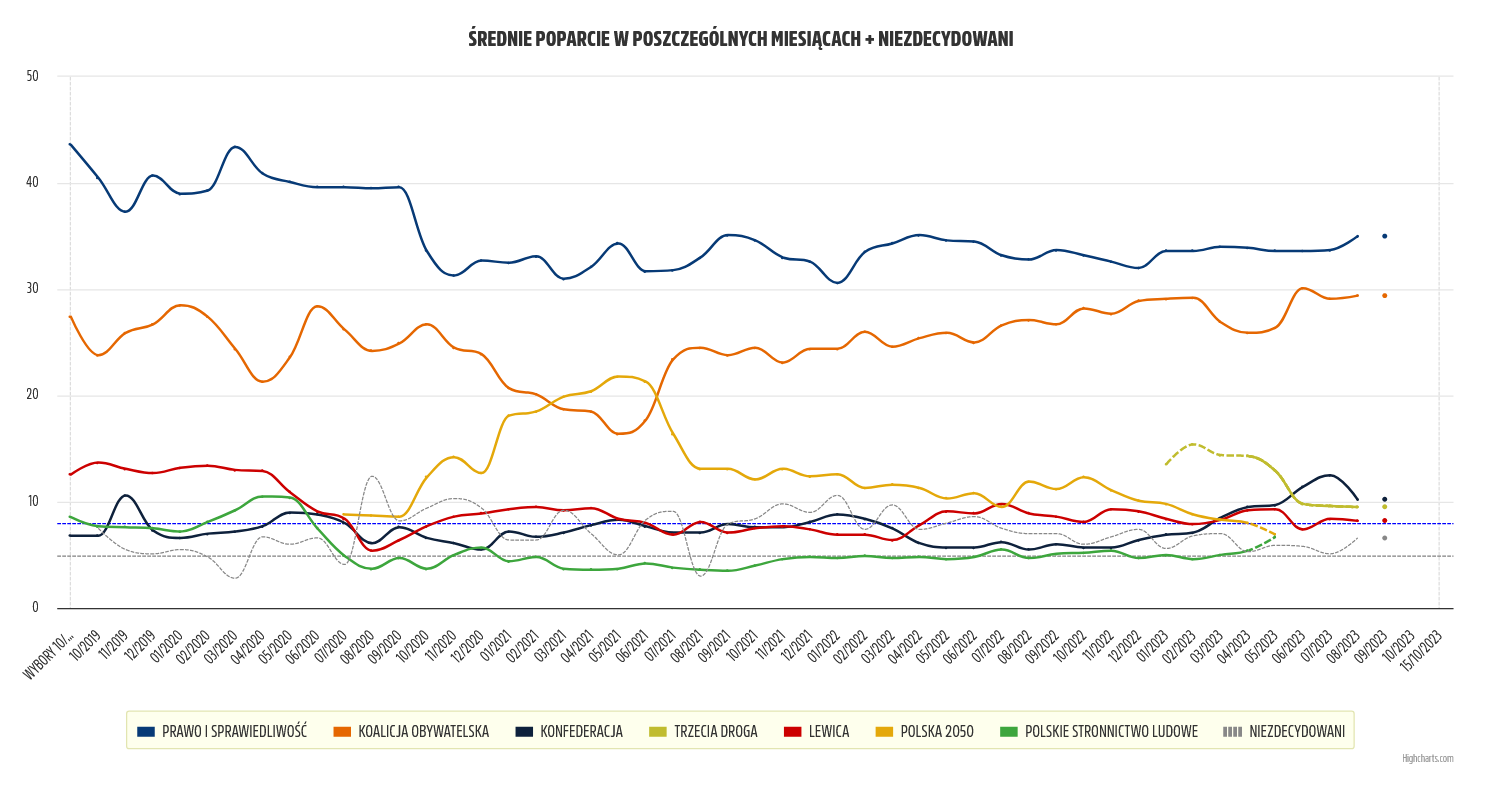Poland’s main left-wing opposition has promised to introduce a 35-hour working week if it comes to power at October’s elections. It also unveiled three new female co-leaders to join its existing three male ones.
At a conference in Łódź on Saturday, The Left (Lewica) also pledged to ban unpaid internships and insecure “junk contracts”, as well as to work with other mainstream opposition parties to prevent the ruling national-conservative Law and Justice (PiS) party and far-right Confederation (Konfederacja) from forming the next government.
Karty na stół – #SerceMamPoLewej to hasło naszej kampanii wyborczej ‼️♥️ pic.twitter.com/PKddyPNDW8
— Lewica (@__Lewica) September 2, 2023
The Left is the third-largest group in parliament but is currently running only fifth in the polls, with support of around 8%. However, it is likely that, if the opposition are to have any chance of forming a government after the elections, The Left would need to be part of a ruling coalition.
Until now, The Left has been led by three men – Włodzimierz Czarzasty, Adrian Zandberg and Robert Biedroń – representing each of the parties that make up the grouping. On Saturday, three women – Magdalena Biejat, Agnieszka Dziemianowicz-Bąk and Joanna Scheuring-Wielgus – were unveiled as new co-leaders.
“We’re like the Avengers,” declared Biedroń. “We have superpowers and no one will stop us.”
The Left has set out plans to end the "toxic relationship" between church and state
It includes ending Catholic catechism classes in schools, abolishing the crime of offending religious feelings, banning exorcisms on minors and renegotiating the concordat https://t.co/n7TAMPlu6w
— Notes from Poland 🇵🇱 (@notesfrompoland) July 31, 2023
During his speech, Zandberg pledged that “we will shorten work to 35 hours a week and increase salaries in the [public] sector”, reports financial news service Money.pl.
The Left last year submitted a bill to parliament to reduce the working week from 40 to 35 hours. However, the legislation has stalled due to a lack of support from PiS. A deputy finance minister, Artur Soboń, called the idea “detached from reality”.
However, The Left argues that the 40-hour working week – a practice established in Poland around a century ago – no longer corresponds to today’s realities. It also points to data showing that Poles work some of the longest hours among developed countries.
“There is really no reason for a Pole to work hundreds of hours more [a year] than a German, French or Austrian,” said Zandberg, quoted by news website Gazeta.pl. “We have the right to rest, spend time with family, go on holiday, practice our hobbies.”
The Left says that it has received backing for its proposal from major trade unions and also some positive signals from the centrist Civic Platform (PO), the main opposition party, whose leader Donald Tusk last year said he would be interested in piloting the idea of four-day working weeks if they come to power.
Asked today in an interview with Radio Zet whether reducing working hours would also lower salaries, Zandberg denied this, pointing to the fact that Poland has a relatively low unemployment rate. “If someone wants to push salaries down, market forces will make it difficult for them,” he said.
During Saturday’s conference, Zandberg also pledged that The Left would end unpaid internships and so-called “junk contracts”, which do not give the same security as full employment contracts.
Meanwhile, Czarzasty said that they would “guarantee that pensions and disability benefits are indexed twice a year” in order to ensure they rise alongside inflation, which has recently been at its highest level in a quarter of a century.
Poland devotes proportionally less to social support than the EU average and its spending “is not always properly targeted”, says the @EU_Commission.
But the proportion of people at risk of poverty has been declining and is among the EU's lowest, it adds https://t.co/9qzaq1lMBV
— Notes from Poland 🇵🇱 (@notesfrompoland) May 26, 2022
Czarzasty also warned voters to “beware of groups that lure you with simple answers to difficult questions”, such as Confederation, which has risen rapidly in the polls on the back of an economically libertarian message.
“It is easy to tell young people that there will be no taxes, that you will not pay health insurance,” said Czarzasty. But “if there are no taxes, there will be no pensions, no public health, no roads, no public services.”
He warned that it was vital to ensure that The Left, Civic Coalition (KO, an alliance dominated by PO) and the Third Way (Trzecia Droga, a centre-right alliance) all enter parliament to help prevent Confederation and PiS from forming a government.

Monthly polling averages for Poland’s main political groups (source: ewybory.eu)

Notes from Poland is run by a small editorial team and published by an independent, non-profit foundation that is funded through donations from our readers. We cannot do what we do without your support.
Main image credit: Klub Lewicy/Flickr (under public domain)

Daniel Tilles is editor-in-chief of Notes from Poland. He has written on Polish affairs for a wide range of publications, including Foreign Policy, POLITICO Europe, EUobserver and Dziennik Gazeta Prawna.



















